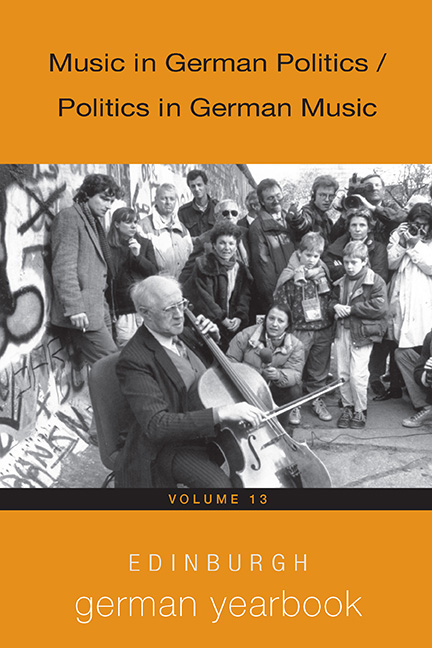Soundtracks of the Holocaust in East and West German Cinema: Jakob der Lügner (1974) and Hitler, ein Film aus Deutschland (1977)
Published online by Cambridge University Press: 26 May 2022
Summary
ISSUES SURROUNDING THE REACTION to and reception of the Holocaust in post-war Germany are complex, owing to the differing politics in East and West Germany and, more recently, the reunified Federal Republic of Germany. The ideological differences between the East and the West far outweighed their geographical proximity and provided two contrasting outlooks on the Holocaust. During the initial postwar decades, the Holocaust was not the focus of much scholarly enquiry worldwide, suggesting that there was not an immediate engagement with the past. Later, debates emerged about how best to engage with the Holocaust in the Germanies, and more broadly in terms of the Germans’ coming to terms with their past, or Vergangenheitsbewältigung. This culminated in West Germany in the late 1980s with the Historikerstreit: a major public debate between left- and right-wing intellectuals, resulting from years of Vergangenheitsbewältigung discourse.
This essay examines the music used in filmic responses to the Holocaust from East and West Germany. The significantly differing musical scores from the two case studies, Jakob der Lügner (Jacob the Liar, East Germany, 1974) and Hitler, ein Film aus Deutschland (Hitler, a Film from Germany, West Germany/France/UK, 1977), are analyzed and examined in relation to their political and filmic contexts and confines. The two case studies are not intended to be representative of the two countries and their film studios but have been selected for the unique way they each use music to represent their shared National Socialist history.
East Germany
The history of East German cinema has been described as convoluted, contradictory, paradoxical, and complicated: both fascinating and sobering. Films were oftentimes confined by the doctrines of socialism, and at other times enjoyed periods of thaw, whereby restrictions upon the artistic license and creativity of filmmakers were relaxed slightly. East Germany's engagement with the National Socialist past on screen resulted in some memorable films. Largely responsible for this success was DEFA (Deutsche Film-Aktiengesellschaft), the state-owned East German film company that produced over 750 films during four and a half decades of operation.
- Type
- Chapter
- Information
- Edinburgh German Yearbook 13Music in German Politics/Politics in German Music, pp. 133 - 150Publisher: Boydell & BrewerPrint publication year: 2022



